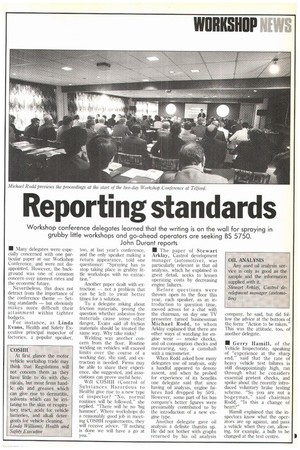Reporting standards
Page 133

If you've noticed an error in this article please click here to report it so we can fix it.
• Many delegates were espe:ally concerned with one particular paper at our Workshop Conference, and were not disappointed. However, the background was one of common concern over interest rates and the economic future.
Nevertheless, this does not detract from the importance of the conference theme — Setting standards — but obviously makes more difficult their attainment within tighter budgets.
For instance, as Linda Evans, Health and Safety Executive principal inspector of factories, a popular speaker,
too, at last year's conference, and the only speaker making a return appearance, told one questioner: "Spraying has to stop taking place in grubby little workshops with no extraction."
Another paper dealt with extraction — not a problem that can be left to await better times for a solution.
To a delegate asking about friction materials, posing the question whether asbestos-free materials cause some other danger, Evans said all friction materials should be treated the same way. Why take risks?
Welding was another concern from the floor. Routine welding on vehicles will exceed limits over the course of a working day, she said, and extraction is needed. Firms may be able to share their experience, she suggested, and associations can prove useful here.
Will COSHH (Control of Substances Hazardous to Health) give rise to a new type of inspector? "No, normal routines will be followed," she replied. "There will he no 'big hammer'. Where workshops do a reasonably good job in meeting COSHH requirements, they will receive advice. "If nothing is done we will have a go at you."
• The paper of Stewart Arklay, Castrol development manager (automotive), was particularly relevant in that oil analysis, which he explained in great detail, seeks to lessen operating costs by decreasing engine failures.
Before questions were thrown open to the floor this year, each speaker, as an introduction to question time, moved across for a chat with the chairman, on day one TV presenter turned businessman Michael Rodd, to whom Arklay explained that there are other ways of watching for engine wear — smoke checks, and oil consumption checks and measuring, say, a camshaft with a micrometer.
When Rodd asked how many delegates use oil analysis, only a handful appeared to denote assent, and when he probed for experience of its benefits one delegate said that since having oil analysis, engine failures had dropped by 50%. However, some part of his bus company's better figures were presumably contributed to by the introduction of a new engine type.
Another delegate gave oil analysis a definite thumbs up. He did not bother with graphs returned by his oil analysis company, he said, but did follow the advice at the bottom of the form: "Action to be taken." This was the attitude, too, of another delegate.
IN Gerry Hamill, of the Vehicle Inspectorate, speaking of "experience at the sharp end," said that the rate of heavy vehicle test failures is still disappointingly high, ran through what he considers essential pretest checks, and spoke about the recently introduced voluntary brake testing scheme. "So you are not a bogeyman," said chairman Rodd. "Is this a change of heart?"
Hamill explained that the inspectors know what the operators are up against, and pass a vehicle when they can, allowing, for example, a bulb to be changed at the test centre.


























































































































































